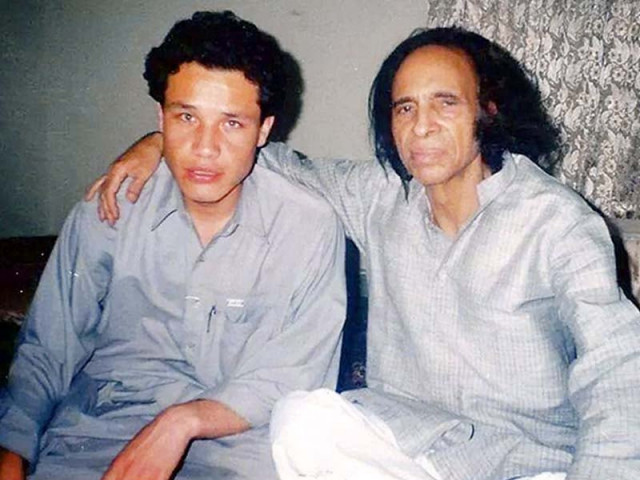Where did Mohsin Changezi go?
Poet whose name spread like fragrance in the world of Urdu ghazal now disillusioned with the state of mushaira

The young Changezi made a huge impression on Jaun and the ailing poet granted him the status of a disciple. PHOTOS: FILE
The 35-year-old Mohsin Changezi surfaced on the horizon of Urdu literature only recently and took the institution of mushaira by storm. Despite his young age, he penned complex ideas, fully doused in classical topoi. He soon became one of the most sought-after poets in mushairas and was touted by many optimists as the next popular poet of Urdu literature after Atta Shad, who held the language’s mantle in Balochistan, and the inheritor of the legacy of classical giants.
But then, his appearances at events reduced over time. He became known for his matter-of-fact persona and would leave podiums with audiences requesting him to continue, something I witnessed myself.

But now, Changezi prefers the solitude of his Mari Abad house in Quetta to most outings. He makes a few trips to his father’s clinic every now and then and is waiting for his posting as a college lecturer. “You know, recognition in the world of literature is slow-paced,” he tells The Express Tribune. Changezi was interested in writing for acclaimed literary journals and publications, and still is, but he does not fancy TV appearances and a high frequency of mushaira-going. “My friends used to persuade me to go everywhere and force my popularity through but that no longer interests me.”
Poet Jamiluddin Aali passes away in Karachi
With poetic meetings and conferences in general, and the Aalmi Mushaira of Karachi in particular, thin attendance, unruly crowd and organisational delays have become a staple. “Things weren’t that bad until around 2005. There were people who took literature seriously and the mushairas were encouraging. Then on, things have been a little rough, especially at the Aalmi Mushairas of 2009 and 2012. It’s very disappointing.” He mentions a recent such event from Lahore attended by Indian dignitaries as well. “There were few people in attendance except the guests. The moment the food was served, the entire hall was full,” he says.
Changezi feels hardly anyone takes literature seriously anymore. “Those who write books are actually the ones who buy them.” The media has its own share of the blame. “Hardly any TV channel today airs a programme dedicated to literature. People just don’t want to talk about it now.” That isn’t to say good writers don’t exist. “There are several people who are doing a great job. Writers such as Dr Waheed Ahmed, Inam Nadeem, Faizan Hashmi and Shahid Zaki are producing high literature.”

Changezi’s own literary inspirations range from Pirzada Qasim and Amjad Islam Amjad to Sarwat Hussain, Jamal Ehsani to Munir Niazi. To the chagrin of many of his contemporaries and seniors, he holds the privilege of being acclaimed by literary giants of his time, the likes of Zamir Jafri and Ahmed Faraz. “Mohsin’s name has spread like fragrance in the world of Urdu ghazal,” Niazi once said for him. For Changezi, the onus of catching the public eye was nothing as compared to the expectations of giants who held him in high regard. “Pressure barh jata hai. People then scrutinise your work accordingly.”
Faiz festival: Master critic eulogises immortal poet
Changezi at age 20
He started playing with words seeing his Urdu lecturer Nawab Khan in college. The teacher’s interest in poetry and theatric style inspired him to start writing. However, this inspiration ensued in a hiatus that ended with Changezi’s Nishan-e-Ghazal-winning Kufa-e-Shab Ne Jo Tabeer Ki Hadd Jari Ki that trumpeted his arrival.
The year was 2000. Dr Inamul Haq Javeid, who heads the National Book Foundation, used to take out a monthly from Islamabad, which carried poetry of writers below the age of 50. Changezi sent in this ghazal that he had written. Karachi’s Aalmi Mushaira was seeing the peak years of its popularity in those days. Mohsin was asked to attend it but there was a problem. The stage was set and invites had already been printed, with Changezi’s name nowhere on the list.

Amjad Islam Amjad , Ahmad Faraz and Mohsin Changezi
Senior poet Mohsin Bhopali still insisted Changezi fly from Quetta and participate in the mushaira. The order of recitals in a mushaira is serious business. Since the line-up for this event was already locked, the problem was when to let Changezi read. Saleem Kausar had just finished and the crowd was roaring in applause of the poet. After a moment of murmurs and nods, Changezi was summoned to the microphone.
“Call it irony or luck but people generally pay attention whenever a relatively young and inexperienced-looking poet speaks into the microphone,” he says. He might be looking at a sizeable crowd whose eagerness would make anyone nervous but what forced him to swallow his tongue was the presence of the likes of Jaun Elia, Iftikhar Arif and Irfan Siddiqui on stage. He mustered up courage and fetched the piece of paper on which he had scribbled the same ghazal that he submitted to Javeid, with his recital leaving most attendees in awe.
Urdu will survive as it is a fusion of regional languages: Jamil
Changezi returned to Quetta and things were back to normal. A few days later he received a call from Islamabad, informing him his ghazal had bagged the first prize and that a cash award of Rs100,000 was waiting for him. This was followed by a string of mushaira invites that hasn’t ended as yet.
The young Changezi made a huge impression on Jaun. The ailing poet visited Quetta on Changezi’s request and admitted him in his circle, granting him the status of a disciple. “Mohsin, tumhara Jaun bhai tum par apne baatin se naazaan hai,” Jaun wrote for him. Jaun’s death had a profound impact on Changezi. “His passing away left a void that I wasn’t able to fill for a long time,” he shares.
Despite his grievances, Changezi didn’t give up the pen and has been writing consistently for the past 15 to 16 years and went on to publish about five collections. “All the other things aside, a poet’s fundamental job is to force himself to write. My new collection called Khali Kaghaz is almost ready. It should be out in five to six months,” he adds.
Published in The Express Tribune, December 13th, 2015.
Like Life & Style on Facebook, follow @ETLifeandStyle on Twitter for the latest in fashion, gossip and entertainment.



















COMMENTS
Comments are moderated and generally will be posted if they are on-topic and not abusive.
For more information, please see our Comments FAQ